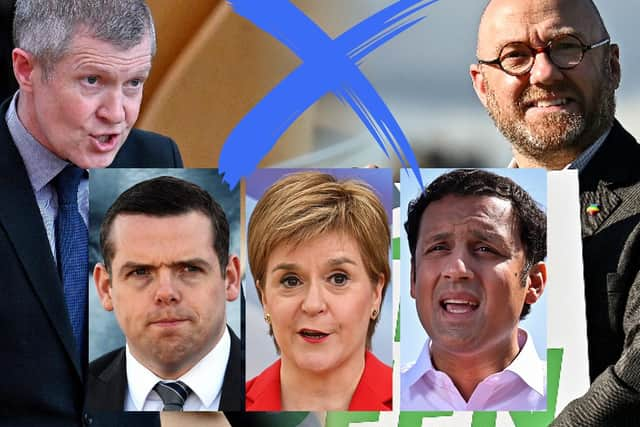Who should I vote for in Scottish election 2021? Main policies explained for SNP, Tories, Labour, Greens, Lib Dems
and live on Freeview channel 276
There is only a couple of days left for people in Scotland to decide who to vote for in the election.
Thursday 6 May will see voters descend on polling stations, with social distancing in place, to cast their ballots after a campaign trail like no other due to the coronavirus crisis.
Advertisement
Hide AdAdvertisement
Hide AdScots will vote for their representatives who will work on their behalf in Holyrood across devolved issues including health, education, housing, justice and the environment.


Everyone in the country is represented by eight MSPs - one for their constituency and seven for the larger electoral region in which they live.
But how do you know who to vote for?
Here’s a simple guide to each of the five largest parties’ main policies.
Who should I vote for in the election?
SNP
Led by First Minister Nicola Sturgeon, the SNP is currently on-course to win a fourth term in office following the 6 May vote.
Advertisement
Hide AdAdvertisement
Hide AdBut the party is seeking an overall majority to gain a strong mandate to hold a second independence referendum, which is one of its main policies.
It also wants to:
- Increase NHS frontline spending by over £2.5billion
- Create a National Care Service
- Freeze income tax and bands
- Provide free school lunches and breakfasts to primary school pupils
- Pilot a four-day working week
- Build 100,000 new homes by 2032, keeping 70 per cent of these for social rent.
Scottish Conservatives
Douglas Ross is the leader of the Scottish Tories, which is a Unionist party.
Advertisement
Hide AdAdvertisement
Hide AdAs well as being opposed to another independence referendum, the Conservatives want to:
- Rebuild the country from the Covid crisis and “end division”
- Invest £2billion extra in the NHS
- Tackle unemployment by making it the top priority of next parliament, including a £500 “Retrain to Rebuild” grant
- Create at least 200,000 jobs, investing in improving roads, railways and a full fibre broadband rollout
Advertisement
Hide AdAdvertisement
Hide Ad- Make a school catch up plan, including employing 3,000 more teachers
- Focus on more local policing.
Scottish Labour
Labour, led by Anas Sarwar, is also opposed to a second vote on Scottish independence and wants to shift the focal point away from a referendum to recovery from Covid.
The party, if elected, aims to:
- Restart the NHS after the pandemic, with a focus on prioritising cancer patients, improving mental health and increasing pay for carers
- Guarantee a job for every under-25 in Scotland which would equate to 60,000 roles
Advertisement
Hide AdAdvertisement
Hide Ad- Put in place a “personal comeback plan” for every school pupil after Covid
- Double the Scottish Child Payment to £20
- Invest in green jobs by retrofitting all homes by 2030 and building energy efficient council houses
- Create a community recovery fund to invest in local areas.
Scottish Greens
Patrick Harvie and Lorna Slater co-lead the Scottish Greens, which is another pro-independence party.
Advertisement
Hide AdAdvertisement
Hide AdIt is heavily focused on tackling the climate emergency, and other devolved issues, by:
- Providing fast-action on climate change, including a rapid rollout of low carbon domestic heating and supporting the onshore wind sector
- Bigger investment in Scotland’s railways and an integrated transport system
- Creating jobs through the energy transition to net zero emissions
Advertisement
Hide AdAdvertisement
Hide Ad- Paying health and social care workers at least £15 an hour
- Swapping school exams for a model of continuous assessment
- Doubling the new Child Payment.
Scottish Liberal Democrats
The Lib Dems, led by Willie Rennie, is one of the smaller main political parties in Holyrood.
It is a pro-Union party, and instead of independence it wants to push for federalism.
The other main policies are:
Advertisement
Hide AdAdvertisement
Hide Ad- Invest in mental health by directing 15 per cent of health spending to the issue, training more specialists for hospitals, workplaces and schools
- Guarantee a job for every qualified teacher in Scotland under an education bounce-back plan
- Double the Scottish Child Payment
- Tackle homelessness by building 60,000 affordable homes
- Declare a “nature emergency” alongside the climate emergency and create a green jobs revolution
- Guarantee a job or training for young people up to age 24.
What about the smaller parties?
In total, there are 25 parties contesting the election.
Advertisement
Hide AdAdvertisement
Hide AdAs well as the five main political parties in Scotland, who won seats in 2016, there are six other parties who are standing enough candidates in every region to qualify for a party election broadcast.
These are:
Alba Party led by Alex Salmond seeks to create a “supermajority” of MSPs who support independence.
All for Unity supports the Union and wants to form a cross party Government of National Unity with the large pro-Union parties after the election.
Freedom Alliance opposes the emergency Covid restrictions introduced during the pandemic, including lockdowns.
Advertisement
Hide AdAdvertisement
Hide AdUKIP wants the Scottish Parliament scrapped, along with the other devolved administrations in Wales and Northern Ireland.
Reform UK wants to simplify the tax system and opposes independence and more lockdowns.
Scottish Family Party believes family life “underpins society” and wants tax cuts for parents, abortions restricted, marriage promoted and the Curriculum for Excellence scrapped.